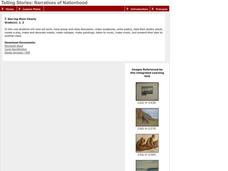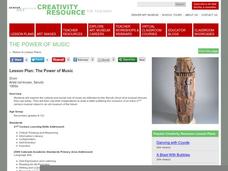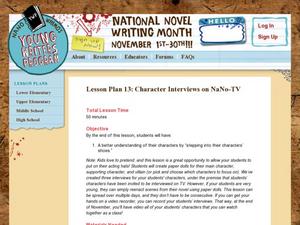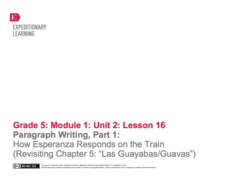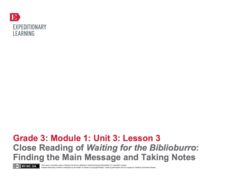Teach with Movies
Teaching Students to Write a Narrative
Encourage narrative writing with a clever exercise. Class members watch episodes from movies and describe what happened to a character, including details about the setting, plot, and characters. Writers then craft a narrative about a...
Curated OER
Sea-ing More Clearly
Explore works of art with your class by engaging them in a variety of artistic activities including papier-mache sculpture, poetry, performance, and more. After viewing and discussing four paintings of the sea by Robert Harris, learners...
Academy of American Poets
Poems about Poetry
Learners of all ages hear the words “Today we’re going to start poetry” and begin their plans to drop out of school. It is not the teacher's fault! Use this resource to help young scholars understand the genre of poetry and why it is...
Curated OER
Round-Robin Reading Quiz
Small groups of learners read text round-robin style, and then work individually to answer three questions based on the text. Next, they share their questions and responses and add ideas from the group. The reading strategies detailed...
Curated OER
Wagons West!
The first pioneers faced many obstacles on their journey west. Middle schoolers read different historical fiction texts (ideas are provided), make connections, and complete a detailed packet (included). Reading guides, journal ideas, and...
Curated OER
Social Studies Wonders: An Exploration
Help middle schoolers conduct Internet research and develop a working definition for the discipline of social studies. From a list of websites, they develop classification skills and differentiate between primary and secondary sources....
Curated OER
Lesson: The Power of Music
The sounds of the past echo through art and our social understanding. Will the sounds of today echo into the future? Learners discuss the cultural and social impact of music, then analyze the art on an African Drum. They develop...
Curated OER
Gettin' Through Thursday
Have your class explore active reading strategies! In this guided reading lesson, learners make personal connections to characters having a bad day as a prior knowledge activation discussion. After reading Gettin' Through Thursday, class...
Read Works
Signal Words in Expository Text
Signal words are one way that authors make the relationships between their ideas clear. Allow your learners the chance to investigate cause and effect in texts by identifying signal words. They locate and analyze cause-and-effect...
Media Smarts
Challenging Hate Online
Looking at the different ways organizations disseminate their messages using digital media leads to developing a digital anti-hate media campaign. Although some of the resources reflect the Canadian developer, the links provide...
Curated OER
Lesson Plan 13: Character Interviews on NaNoTV
Kids love to pretend. Use this imaginative energy to develop their understanding of characterization. Class members dress up as a character from their novel-writing project and sit for a filmed interview. In responding to questions about...
Scholastic
Writing Letters to the Chancellors of the Academy of American Poets
To celebrate National Poetry Month, young writers focus on the role letter writing has played in the development of poets. They begin by journaling three to five associations to a writing prompt that requires them to identify their...
Curated OER
Race and Crime in the United States: Are We Victims of Discrimination or Antiheroes?
Using methods adopted by Public Policy Analysts (PPA) class groups define a social problem, gather evidence to document the existence of the problem, identify causes, evaluate existing policies designed to deal with the problem, develop...
EngageNY
End-Of-Unit 2 Assessment: On-Demand Analytical Essay About How Esperanza Changes Over Time
Close the unit on Esperanza Rising with an in-class analytic essay on how Esperanza changes over the course of the novel. Writers can use any of their notes and work from the unit as well as their drafts of the first two paragraphs of...
EngageNY
Paragraph Writing, Part 1: How Esperanza Responds on the Train (Revisiting Chapter 5: "Las Guayabas/Guavas")
When your class members have completed the novel Esperanza Rising, they will be ready to write an expository essay on how Esperanza responds to events and what this says about her character. Set your pupils up for success by starting out...
EngageNY
Close Reading of Nasreen's Secret School: How Do People Access Books in Afghanistan?
Third graders continue to practice the close reading skills of capturing the gist and reading again for important details in the sixth lesson in a larger unit. This is a great beginning-of-the-year unit for establishing visible thinking...
EngageNY
End of Unit 1 Assessment: Inferring and Synthesizing (From Two Texts) About Life in Colonial America
Close your colonial America unit with a performance-based assessment. Class members will show their proficiency in several skills including using details to back up inferences, determining the meaning of words in context,...
EngageNY
Close Reading of Waiting for the Biblioburro: Finding the Main Message and Taking Notes
Expose your class to Waiting for the Biblioburro, narrative nonfiction that will act as the bridge between ficiton and informational texts to come. Class members do a close reading of the text, looking at excerpts instead of the whole...
Lied Center of Kansas
The Ugly Duckling and The Tortoise and the Hare
Both The Ugly Duckling and The Tortoise and the Hare are great additions to an elementary language arts lesson. Young readers focus on the literary elements of each story, including characters and plot development, and apply counting and...
Virginia Department of Education
Identifying the Main Idea in Fiction
Discovering the main idea in fiction is like uncovering buried treasure; one must persevere to locate it, and the reward is priceless. Scholars delve deep into leveled stories using three questions to aid in identifying the main idea.
EngageNY
Mid-Unit Assessment: Close Reading of the "Spadefoot Toad"
A mid-unit assessment challenges scholars to use their close reading skills to identify the main idea and key details. After reading a brief excerpt, learners answer a series of questions—multiple-choice, short answer—complete a graphic...
EngageNY
Comparing and Contrasting Two Texts about Poison Dart Frogs: Eggs and Tadpoles
Poison Dart Frog babies are the focus of a lesson that challenges scholars to compare and contrast two informational texts. Beginning with a read-aloud, followed by a discussion, readers complete a practice page that examines the main...
EngageNY
Establishing Structures for Reading: Gathering Evidence about Salva’s and Nya’s Points of View (Reread Chapters 1 and 2)
Readers practice gathering textual evidence to support their understanding of character point of view in A Long Walk to Water by Linda Sue Park. Working with partners, they complete a Gathering Evidence graphic organizer and engage in...
EngageNY
Analyzing the Central Ideas, Part 1: “The Border”
What is your strategy? Scholars read "The Border" and work with a partner to practice reading strategies to use while independent reading. They identify difficult parts where they practiced rereading by marking them with sticky notes,...



